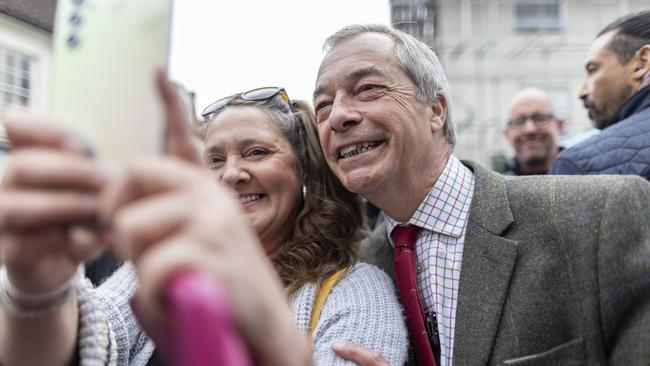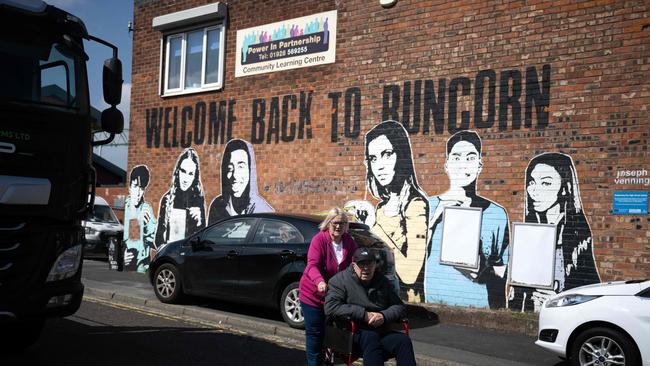Reform’s rapid ascent offers risk and reward

This time, however, is different. I believe that Thursday will be a genuinely significant political event. Quite probably one of historical importance.
The opinion polls should already lead us to expect huge swings away from what have historically been the two main parties. To this will be added a difference in voter enthusiasm, producing an even larger win for Reform, the Liberal Democrats and the Greens. Labour may well come third. The Tories may well come fourth.
And the result will crystallise the change in party fortunes that has been taking place over the last year. It will make obvious how Labour is struggling as a governing party and how little headway the Tories are making. But most significantly, it will mark the moment of arrival of Reform as a serious contender. Its potential to be a serious challenger will become reality.
The temptation will be immediately to consider what this means for Sir Keir Starmer and Kemi Badenoch, and that’s perfectly reasonable. But it risks missing the point. Thursday will mark the arrival of Reform as a party of office, and so considering what the result means for Reform is at least as important as the impact upon its vanquished rivals.

There will be problems for Nigel Farage’s party, for certain, but it is absurd to start with them. The victory will be a remarkable political achievement and bring the rewards remarkable political achievements garner. The most obvious will be momentum. Nothing is less true than the idea that people love underdogs. If they did, everyone would be a fan of a non-league football team.
People love winners. They want to associate with them and claim part of the glory. They see someone open a bottle of champagne on TV and they’d like a glass. Politicians sense this and it’s why, even as they “manage expectations”, no one ever announces before an election that they are doomed to landslide defeat – even if it is clear this is what is about to happen.
Part of this momentum will be provided by a scramble by everyone else to address Reform’s agenda. This will doubtless fail, while making whoever does it look a little ridiculous. And Nigel Farage will remain better at being Nigel Farage than anyone else trying to do it.
To this momentum will be added the fact that Reform victories rob the Conservatives of a crucial argument: that a vote for anyone other than the Tories is a vote for Labour. This will be revealed as plainly untrue.
Winning councillors will also mean Reform has a local infrastructure in many of the places where it wishes to contest the next general election. That will help greatly with local campaigning. And nationally, from being an organisation from which media outlets struggle to find an appropriate available spokesman, Reform will become one with hundreds of elected representatives. A big advantage.

But that is also, of course, where the problems start. On Friday Reform will cease to be a party that Farage can completely control. The people to whom at least some of that control will pass are unknown, not only to the general public but also to Farage himself. Naturally, some of them will be eccentric. Others will be extremely difficult people. Some will have been, or will shortly be, embroiled in scandal. This may be at a higher rate than for the other parties but Reform will reasonably point out that wayward personalities are hardly unknown in Labour or the Tories. After all, tomorrow’s (Thursday’s) by-election was caused by a Labour MP punching one of his constituents in a late-night brawl.
More interesting will be the problems posed to Reform’s leadership by its more vanilla councillors. This will begin with their decisions about whether to form local coalitions. The question of whether the Tories should work with Reform is normally treated as a Conservative dilemma (and it is that). But it is even more controversial within Reform.
The party leadership will have to decide whether to sanction such local arrangements, which may prove the only way of governing a council. If they do not sanction them, what do they do if the councillors go ahead anyway?

This is linked to an even more important question. In so far as Reform councillors win power, what should they do with it? There may be some actions they can take that are not controversial within the party or among its voters – abandoning certain green policies or diversity initiatives, for instance. But beyond this, things may get a little harder.
The trickiest (but also potentially politically the most potent) area is likely to be the most important: the housing of migrants. Reform councillors will doubtless resist the accommodation of refugees in their locality and overwhelmingly will enjoy voter support in doing so. It will be a rich seam of grievance to mine and the party will mostly be able to work harmoniously upon the mining at local and national level. It will be one more way in which tomorrow’s (Thursday’s) results will tilt politics towards Reform.
But it is easy to see Reform councillors advancing policies that are legally beyond the power of local councils or interacting with far-right groups in a way that makes Farage profoundly uncomfortable. The extent to which Reform should support the Tommy Robinson right is deeply contested within the party and it is hard to tell which side of the internal argument the election results will favour.
This is not a theoretical question. In the early 1970s (with the Clay Cross councillors in Derbyshire) and again in the 1980s (in Lambeth and Liverpool) Labour was deeply split by rows between councillors and the leadership about whether or not to abide by the law and about the relationship with political forces that favoured extra-legal measures.
The choice for Reform will be between challenging authority and the usual conduct of local government in ways that risk making the party look wild, or accommodating to the other parties and the existing rules. That may actually be the riskier option, since Reform’s appeal is precisely that it represents a rebellion against a politics that is thought to have failed.
Farage may find this difficult to navigate, particularly as he can be brittle and distrusts his own supporters. But before he encounters such challenges he will be entitled to feel pretty pleased with himself. What is about to happen is undoubtedly a pretty remarkable political triumph.
The Times



This time it is different. My normal approach to local election results is to argue that everyone is getting carried away. They don’t tell you much about national opinion that we don’t already know. They are, after all, a bad national opinion survey. The only reason they look any different from your average YouGov poll is because the question, the turnout and the geographical coverage are not properly weighted. Beyond that, they change local councils but it is easy to read too much into them about the political future.